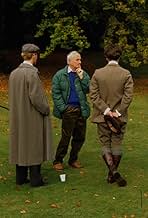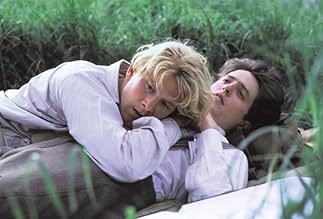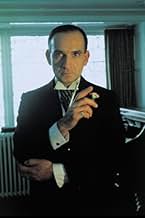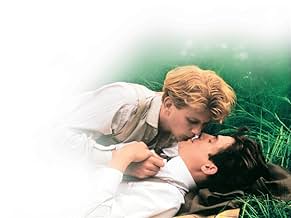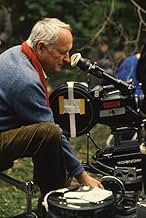Después de que su amante lo rechaza, un joven atrapado por la opresión de la sociedad eduardiana intenta llegar a un acuerdo y aceptar su sexualidad.Después de que su amante lo rechaza, un joven atrapado por la opresión de la sociedad eduardiana intenta llegar a un acuerdo y aceptar su sexualidad.Después de que su amante lo rechaza, un joven atrapado por la opresión de la sociedad eduardiana intenta llegar a un acuerdo y aceptar su sexualidad.
- Nominado a 1 premio Óscar
- 3 premios ganados y 2 nominaciones en total
- Dirección
- Guionistas
- Todo el elenco y el equipo
- Producción, taquilla y más en IMDbPro
Argumento
¿Sabías que…?
- TriviaIn the DVD extras, Hugh Grant says that because he and James Wilby already knew each other from appearing in Privileged (1982) together, they were able to practice their scenes together at Grant's house the night before Wilby's audition. Grant says that he remembers it "being a surprise to my banker brother when he came home and found me kissing James Wilby in the front room."
- ErroresDuring one of the earlier scenes while Maurice and others are reading/translating with a professor/dean, Maurice is seen clearly wearing a wristwatch. While wristwatches did exist at the time they were rare, and were considered working class so would not have been worn by a gentleman. The wristwatch would not become common until the first world war, when they were given to soldiers to allow them to see the time while both hands were engaged.
- Citas
Maurice Hall: I'm an unspeakable of the Oscar Wilde sort.
- Versiones alternativasSome NTSC versions are scanned at 25fps and the running time is short and seems edited but the movie is intact.
- Bandas sonorasMiserere Psalm 51
Written by Gregorio Allegri
Sung by The Choir of Kings College Cambridge
Courtesy of The Decca Record Company LTD.
Opinión destacada
When E M Forster wrote "Maurice" homosexuality was considered a mental illness, a criminal offence, an aberration, a sin against God, (it still is in some quarters). It wasn't so long since Oscar Wilde was jailed for sodomy and Forster, had his own homosexuality become public knowledge, would certainly have found himself in a similar predicament and would never have enjoyed the literary eminence that he did. So consequently, moved though he was to write the book, gave instructions that it should not be published until after his death, and Forster lived for a very long time. When "Maurice" eventually did see the light of day, it seemed terribly dated. 'I'm an unspeakable of the Oscar Wilde sort', Maurice tells his doctor in a feeble attempt to be 'cured' of his 'affliction', and a line which the movie retains. Gay literature had come a long way in the interim and homosexuality was no longer seen as an illness nor a crime.
But Forster's view of homosexuality was, surprisingly, not a tortured, shame-filled one but touchingly, if ridiculously, romantic. When Maurice finally does find true love, it cuts across all barriers including class and has the lovers retreating, like some gay Adam and Eve, to 'the greenwood'. It seems unrealistic but at the same time liberating long before the term 'gay liberation' was ever coined.
James Ivory's screen version is remarkably faithful to the original and consequently risks ridicule in this so-called more enlightened age. But Ivory's intelligence as a film-maker has long been over-looked in favour of an emphasis on his prettified recreations of the past. Yet he remains the pre-eminent chronicler in British cinema, (though American and consistently working with an Indian producer, Ismail Merchant), of a particular period in British history mostly through adaptations of novels by writers of the period or by contemporary authors writing about the period. But when Ivory did adapt 'classic' literature, he concentrated on the best and working mostly with the great writer Ruth Prawer Jhabvala, brought to bear on these adaptations a deeply felt and genuine appreciation of their worth.
Hence "Maurice" is as fastidiously good as we have come to expect, the difference being that this time the script is not by Jhabvala but by Ivory himself and Kit Hesketh-Harvey. In every other respect it looks and feels typically 'Merchant-Ivory', a term some people believe stultified British cinema at a time when other directors were making edgy, contemporary 'new-wave' films. But that is like condemning well-acted, well-crafted Shakespeare just because it's old.
"Maurice" is a superbly acted, visually gorgeous film, though at times its fidelity to its source means that sometimes certain scenes feel stilted, (you make want to give these people a good shaking). And did they need to cast actors as beautiful as James Wilby (Maurice), Hugh Grant, (his first great love, Clive Durham), and Rupert Graves, (the game-keeper Scudder, shades of a gay Lady Chatterly, the boy he finally falls for)? All three play wonderfully well and Ivory populates his film with a cast of wonderful character actors, (Simon Callow, Denholm Elliot, Billie Whitelaw, Judy Parfitt), all playing at the top of their form.
Of course, both book and film have now largely been set aside as dated and irrelevant in the annals of gay literature and cinema. Surely not. The film remains as much an integral part of the history and consequential progress of main-stream gay movie-making as "Brokeback Mountain", (though by no means as commercially successful), as it is an integral part of the Merchant-Ivory stable. Anyone remotely interested in either should seek it out.
But Forster's view of homosexuality was, surprisingly, not a tortured, shame-filled one but touchingly, if ridiculously, romantic. When Maurice finally does find true love, it cuts across all barriers including class and has the lovers retreating, like some gay Adam and Eve, to 'the greenwood'. It seems unrealistic but at the same time liberating long before the term 'gay liberation' was ever coined.
James Ivory's screen version is remarkably faithful to the original and consequently risks ridicule in this so-called more enlightened age. But Ivory's intelligence as a film-maker has long been over-looked in favour of an emphasis on his prettified recreations of the past. Yet he remains the pre-eminent chronicler in British cinema, (though American and consistently working with an Indian producer, Ismail Merchant), of a particular period in British history mostly through adaptations of novels by writers of the period or by contemporary authors writing about the period. But when Ivory did adapt 'classic' literature, he concentrated on the best and working mostly with the great writer Ruth Prawer Jhabvala, brought to bear on these adaptations a deeply felt and genuine appreciation of their worth.
Hence "Maurice" is as fastidiously good as we have come to expect, the difference being that this time the script is not by Jhabvala but by Ivory himself and Kit Hesketh-Harvey. In every other respect it looks and feels typically 'Merchant-Ivory', a term some people believe stultified British cinema at a time when other directors were making edgy, contemporary 'new-wave' films. But that is like condemning well-acted, well-crafted Shakespeare just because it's old.
"Maurice" is a superbly acted, visually gorgeous film, though at times its fidelity to its source means that sometimes certain scenes feel stilted, (you make want to give these people a good shaking). And did they need to cast actors as beautiful as James Wilby (Maurice), Hugh Grant, (his first great love, Clive Durham), and Rupert Graves, (the game-keeper Scudder, shades of a gay Lady Chatterly, the boy he finally falls for)? All three play wonderfully well and Ivory populates his film with a cast of wonderful character actors, (Simon Callow, Denholm Elliot, Billie Whitelaw, Judy Parfitt), all playing at the top of their form.
Of course, both book and film have now largely been set aside as dated and irrelevant in the annals of gay literature and cinema. Surely not. The film remains as much an integral part of the history and consequential progress of main-stream gay movie-making as "Brokeback Mountain", (though by no means as commercially successful), as it is an integral part of the Merchant-Ivory stable. Anyone remotely interested in either should seek it out.
- MOscarbradley
- 7 abr 2006
- Enlace permanente
Selecciones populares
Inicia sesión para calificar y agrega a la lista de videos para obtener recomendaciones personalizadas
- How long is Maurice?Con tecnología de Alexa
Detalles
- Fecha de lanzamiento
- Países de origen
- Sitios oficiales
- Idioma
- También se conoce como
- Moris
- Locaciones de filmación
- Productoras
- Ver más créditos de la compañía en IMDbPro
Taquilla
- Presupuesto
- GBP 1,577,000 (estimado)
- Total en EE. UU. y Canadá
- USD 2,484,230
- Fin de semana de estreno en EE. UU. y Canadá
- USD 49,278
- 20 sep 1987
- Total a nivel mundial
- USD 2,643,324
- Tiempo de ejecución2 horas 20 minutos
- Mezcla de sonido
- Relación de aspecto
- 1.66 : 1
Contribuir a esta página
Sugiere una edición o agrega el contenido que falta



